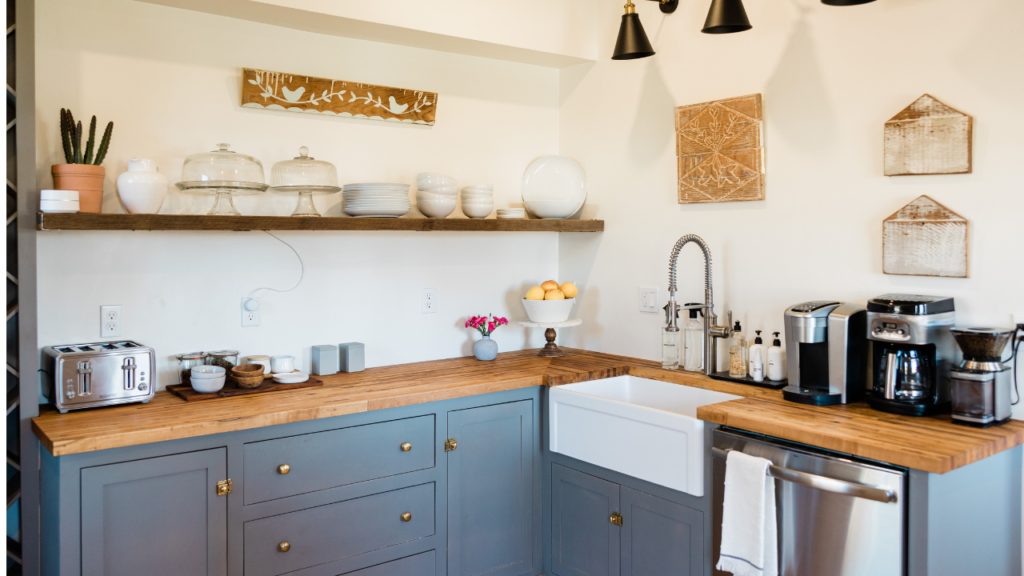Ever walked into your kitchen only to be hit with a foul smell coming from the sink? It’s frustrating—and honestly, a little embarrassing when guests are over. The good news? You don’t have to live with it. Knowing how to make the kitchen sink smell better is easier than you think, and with a few simple tricks, you can keep your sink fresh all the time.
Common Causes of a Smelly Kitchen Sink
Ever caught a whiff of something funky in your kitchen, only to realize it’s coming from the sink? Yeah, we’ve all been there. That lingering, musty odor can turn your whole kitchen into a no-go zone. But why does it happen? Here are some common culprits behind a smelly sink—and trust me, some of them might surprise you.
1. Food Debris Buildup
Ever rinsed a plate without scraping off all the leftovers? Those tiny food particles don’t just disappear—they get stuck in the drain and start breaking down. And guess what? Rotting food smells awful. If your sink smells like last week’s dinner, trapped food bits are probably to blame.
2. Grease and Oil Residue
Cooking oils and grease might seem harmless when they’re liquid, but once they cool, they stick to the pipes like glue. Over time, they trap food, and bacteria, and—boom!—your sink smells like an old frying pan.

3. Bacterial Growth
Your sink is the perfect home for bacteria—warm, damp, and full of food residue. As bacteria multiply, they release gases that create that nasty rotten egg or musty smell. If you’re noticing an odor even after cleaning, bacteria could be the hidden villain.
4. Clogged or Dirty Garbage Disposal
If you have a garbage disposal, it might be hoarding food scraps you thought were gone. Over time, bits of food get stuck in the blades and crevices, leading to a stinky buildup.
5. Plumbing Issues
Sometimes, the problem goes deeper—literally. If your sink smells like sewage, it could be due to a dried-out P-trap (the U-shaped pipe under the sink) or a plumbing leak letting sewer gases escape into your kitchen.
Simple DIY Methods to Eliminate Kitchen Sink Odors
Ever walked into your kitchen and been hit with a whiff of something unpleasant? Yeah, it’s the sink again. The good news? You don’t need fancy chemicals or a plumber on speed dial to fix it. Here are some easy, DIY tricks to banish that stink for good.
A. Baking Soda and Vinegar Solution
This classic combo isn’t just for science experiments—it’s a natural powerhouse for breaking down gunk and killing odors.
- Pour half a cup of baking soda down the drain.
- Follow it up with a cup of white vinegar. (Brace yourself for the fizz—it means it’s working!)
- Let it sit for 10–15 minutes so it can break down buildup and bacteria.
- Flush it out with boiling water to wash away the residue.
💡 Best practice: Do this once a week to keep your drain fresh and clog-free.
B. Lemon and Ice Cube Freshener
Nothing screams “clean” like the scent of fresh lemons. Plus, ice cubes help dislodge gunk hiding at your disposal.
- Cut a lemon into small wedges.
- Drop a handful of ice cubes and the lemon pieces into your garbage disposal.
- Turn it on and let it grind away for about 30 seconds.
- Run cold water down the drain to flush everything out.
🍋 Why it works: The ice scrubs the blades, while the lemon’s natural oils leave your sink smelling citrusy fresh.
C. Boiling Water Flush
Sometimes, simplicity is key. A pot of boiling water can work wonders on grease buildup.
- Boil a kettle or large pot of water.
- Slowly pour it down the drain in two or three stages, pausing between each pour.
- Let it sit for a minute before running cold water to solidify any remaining grease and push it down.
🔥 Pro tip: Use this after cooking with oil to prevent grease from sticking to your pipes in the first place.
D. Salt and Hot Water for Drain Cleaning
Got stubborn gunk clinging to your drain walls? Coarse salt is your secret weapon.
- Pour half a cup of coarse salt down the drain.
- Follow with a kettle of hot water to help scrub away debris.
- Rinse with warm water to ensure everything is washed away.
🧂 Why it works: Salt acts as an abrasive cleaner, breaking down grime without harsh chemicals.
E. Commercial Drain Cleaners vs. Natural Alternatives
If you’re tempted to grab a store-bought drain cleaner, pause for a second. While they work fast, they’re packed with harsh chemicals that can corrode your pipes over time.
✅ Natural alternatives:
- Enzyme-based drain cleaners (safe for pipes and eco-friendly)
- Hydrogen peroxide and baking soda for deep cleaning
⚠️ When to use commercial cleaners: If your drain is seriously clogged and nothing else works, a commercial cleaner might be a last resort—but use sparingly!

Preventative Measures to Keep the Sink Smelling Fresh
Let’s be real—no one wants to deal with a stinky sink every few days. The secret to keeping it fresh? Prevention! With a few simple habits, you can stop bad odors before they even start. Here’s how:
Regular Cleaning Routine
Think of your sink like your countertops—you wouldn’t let grime build up there, right? The same goes for your drain! Make it a habit to:
- Rinse the sink after every use to wash away lingering food bits.
- Scrub the drain and sink basin at least once a week with baking soda and a sponge.
- Pour boiling water down the drain weekly to break down grease before it gets a chance to stick.
Proper Disposal Habits
Your sink isn’t a trash can, but sometimes we treat it like one. Some things should NEVER go down the drain, including:
- Grease and oil – It cools and hardens, creating stubborn clogs.
- Coffee grounds – They clump together and block pipes.
- Eggshells – The tiny pieces can stick to grease and cause blockages.
- Starchy foods (like pasta and rice) – They swell with water and turn into a gluey mess.
Better option: Scrape plates into the trash or compost before rinsing them in the sink!
Using Drain Strainers
A simple mesh drain strainer can be a game-changer. It catches food scraps before they make their way into your pipes. Empty it regularly, and you’ll avoid nasty buildup that leads to bad smells.
Pro tip: Choose a fine-mesh strainer to trap even the smallest food particles!
Maintaining the P-Trap
The P-trap (that U-shaped pipe under the sink) plays a crucial role in keeping sewer gases out of your kitchen. If your sink suddenly smells like rotten eggs, your P-trap might be dry or clogged.
- If you haven’t used the sink in a while, run water for a minute to refill the trap.
- If the smell persists, detach the P-trap and clean it out (place a bucket underneath first!).
Reminder: A functioning P-trap is your best defense against sewer smells creeping into your home!
By following these easy habits, your kitchen sink will stay fresh, clean, and odor-free—no fancy chemicals needed!
When to Call a Plumber
Alright, so you’ve tried everything—the baking soda, the lemon trick, even boiling water. But somehow, your sink still smells like a mix of rotten eggs and regret. At this point, you might be dealing with something more serious than just leftover food scraps. Here’s how to know when it’s time to wave the white flag and call in a professional.
1. The Sewer Smell That Won’t Quit
If your kitchen sink smells like raw sewage, that’s a red flag. A faint odor now and then is normal, but if it lingers no matter what you do, it could mean:
✅ A dried-out P-trap – The U-shaped pipe under your sink holds water to block sewer gases. If it dries out (like in an unused sink), those nasty gases seep into your kitchen. Running water for a minute should fix it.
🚨 A venting issue – Your plumbing system has air vents that release pressure and keep sewer gases from backing up. If these vents are blocked or broken, the smell has nowhere to go but into your home.
👉 Quick Fix: Run water to refill the P-trap. If the smell persists, a blocked vent might be the culprit—and that’s plumber territory.
2. Slow or Gurgling Drain
Ever noticed your sink draining slower than usual? Or heard weird gurgling noises when the water goes down? That’s your pipes crying for help.
🛑 Possible Causes:
- Partial clogs – Built-up grease, food scraps, or soap scum can restrict water flow.
- Blocked vent pipes – When air can’t escape, it creates a vacuum effect, making your sink drain like it’s struggling for air.
- Main sewer line problems – If all your drains are acting up, you might have a bigger issue, like a clogged sewer line.
👉 Quick Fix: Try a plunger or a drain snake. If that doesn’t work and the problem keeps coming back, you need a plumber to check for deeper blockages.
3. Water Backing Up in Other Places
Imagine this: You run your dishwasher, and suddenly, water starts bubbling up in the sink. Or worse—flushing the toilet makes the sink gurgle. If this happens, your plumbing system is waving a distress signal.
🚨 Why This Happens:
- A clogged drain line – Your sink and dishwasher share the same drainage system. A blockage can send dirty water back up into the sink.
- A serious sewer backup – If water backs up in multiple places (like your bathtub, toilet, and sink), your main sewer line is likely clogged. That’s an emergency—call a plumber ASAP!
👉 Quick Fix: If it’s just the sink, try using a plunger or a drain snake. If multiple fixtures are affected, don’t wait—get a pro to check your sewer line.
4. Recurring Clogs That Won’t Stay Gone
You clear a clog, and a week later, your sink is slow again. Sound familiar? If your drain keeps clogging despite your best efforts, you might be dealing with:
💀 Deep pipe buildup – Years of grease, soap, and debris can harden inside your pipes, making DIY solutions useless.
🐀 Tree root invasion – If you have older pipes, tree roots can grow into them, causing repeated blockages.
⚠️ Collapsed pipes – In rare cases, old or damaged pipes can cave in, restricting water flow permanently.
👉 Quick Fix: If a clog keeps coming back, stop dumping store-bought drain cleaners (they can corrode pipes over time). Instead, get a plumber to inspect the drain with a camera—yes, they have tiny cameras for this!
5. Leaks or Water Damage Under the Sink
Ever opened the cabinet under your sink and found a surprise puddle? A small drip might not seem like a big deal, but over time, it can cause mold, wood rot, and expensive damage.
🚰 Common Leak Sources:
- Loose pipe connections – A quick tightening might help, but if leaks persist, a plumber should check it.
- Cracked pipes – Pipes can crack due to age, pressure, or even extreme temperature changes.
- Leaky garbage disposal – The seals on your disposal can wear out, causing slow leaks.
👉 Quick Fix: Place a dry paper towel under the sink and check for wet spots after a few hours. If you find any, it’s time to call in the pros before the damage worsens.
FAQs
Why does my kitchen sink smell even after cleaning?
Ugh, isn’t that the most frustrating thing? You scrub and scrub, but the stink still lingers. The culprit could be lurking deeper in your pipes—old food gunk, grease buildup, or even bacteria thriving in hidden spots. Try flushing your drain with baking soda and vinegar or check your garbage disposal for trapped food bits. If all else fails, your P-trap might be dry or clogged, letting sewer gases sneak up into your kitchen (yikes!). Running water for a minute should fix that.
Can I use bleach to clean my sink drain?
Technically, yes, but should you? Not really. Bleach is powerful, but it’s also harsh on your pipes and can mix with other residues to create toxic fumes. Plus, it doesn’t break down grease or food particles—it just masks the smell. Instead, go for a safer alternative like baking soda and vinegar, or even enzyme-based drain cleaners that eat away at the gunk without harming your pipes.
How often should I clean my sink to prevent odors?
Think of your sink like your fridge—you wouldn’t let old food sit there for weeks, right? A little regular maintenance goes a long way! Here’s a simple schedule to keep things fresh:
- Daily: Rinse the sink after washing dishes and run hot water for 30 seconds.
- Weekly: Scrub the basin with baking soda and a sponge; flush the drain with boiling water.
- Monthly: Do a deep clean with baking soda and vinegar or salt and hot water to break down buildup.
- As needed: If you notice a funky smell, tackle it before it gets worse!
What are the best natural remedies for a smelly kitchen sink?
Nature’s got your back! Here are some tried-and-true remedies that work wonders:
- Baking soda + vinegar: The fizzing action breaks down gunk and deodorizes.
- Lemon and ice cubes: Toss them into your garbage disposal for a fresh citrus scent and blade-cleaning power.
- Boiling water: Perfect for melting grease and flushing out minor clogs.
- Salt and hot water: A natural abrasive that scrubs away hidden grime.
- Enzyme drain cleaners: Safe for pipes and super effective at breaking down organic buildup.
Is it safe to pour boiling water down the drain?
Yes—but with a small disclaimer! Boiling water is great for clearing grease and minor clogs, but if you have PVC pipes, don’t overdo it. Extreme heat can soften the plastic over time. Also, if your sink is completely clogged, avoid dumping boiling water on top of it—it can just sit there and make things worse. Instead, try a plunger or a natural drain cleaner first.
Conclusion
A smelly sink doesn’t have to be a permanent problem. With simple DIY solutions and regular maintenance, you can keep your kitchen fresh and odor-free. Try these tips, and let us know which worked best for you in the comments!

I’m a writer and culinary expert with over 10 years of experience in the kitchen. As a graduate of the Institute of Culinary Education and a passionate home chef, I created KitchenBreez.com to share my knowledge of kitchen techniques, cooking tips, and the best kitchen gadgets. Whether you’re a seasoned cook or just starting, my goal is to help you make your time in the kitchen more efficient and enjoyable.
